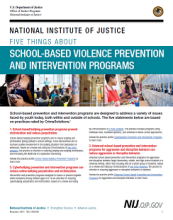Reaching Out versus Lashing Out: Examining Gender Differences in Experiences With and Responses to Bullying in High School
Journal
American Journal of Criminal Justice
Date Published
2018
Agencies
NIJ-Sponsored
Publication Type
Program/Project Evaluation,
Research (Applied/Empirical)


